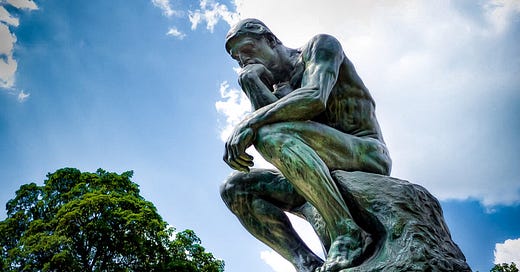In our vocabulary, prudence has come to mean some combination of cleverness, caution, and calculation. The prudent man is not necessarily a good man, but he’s good at self-preservation, whether that means scheming, or saving money, or bending the truth when its useful, or otherwise doing what he’s got to do. Prudence and bravery seem to be almost mutually exclusive—prudence being more a matter dodging those difficult confrontations which might require a man to be brave. You need to be all fox, and leave that lion stuff for the fools.
This picture of “prudence” should prompt a man with a spirited streak to ask: Why would I want to be prudent if it means being lame, calculating, dishonest, kind of cowardly?
Our confusion is what makes Josef Pieper’s The Four Cardinal Virtues an important work. I have encountered no book as illuminating and helpful for understanding what virtue actually means and how it works. To get this wrong is to get everything wrong—which is precisely what modern life wants for us. If you misunderstand virtue, everything else becomes just, like, whatever, man. Complacency and cluelessness reign. A man shrugs at aspirations that don’t seem worthwhile, and ultimately he becomes just the product of his temperament and the schooling he receives from Hollywood producers and state-certified educational professionals.
Prudence is not just one of many virtues—it is the first of the cardinal virtues, the excellences on which the good life “hinges” (the Latin cardo meaning “that on which something turns or depends”). It comes first because it dictates what shape the other virtues take. We are always called to be just, brave, and temperate—but achieving these moral obligations might differ depending on time and place and a thousand different variables. A risk might be worth running today, but not worth running next week when the circumstances have changed. Drinking a fair amount of wine is better when you’re celebrating something important with your friends than when you have nothing to do on a lonesome Tuesday evening. And so on. So prudence is needed to understand what’s what. “All virtue is necessarily prudent,” Pieper explains, because “realization of the good presupposes knowledge of reality.”
To narrow toward a definition: prudence is the virtue by which “the truth of real things is transposed into a decision.” In order to do good, we first have to know about reality and how to realize the good in the specific circumstances before us. This virtue obviously requires the use of the brain, but it is never purely theoretical or speculative or nerdy. It demands strategic thinking, but it goes far beyond that—and is instead about diving deep into reality. In this sense, Pieper suggests that prudence follows right on the heels of the theological virtues of faith, hope, and love. If you believe in God, if you trust in his promises and avoid despair, if you love him and love others for love of him, the next step is to live in state of deep attentiveness to the reality he has created and keeps watch over. This attentiveness will guide you as to how to live.
Prudence makes an art-form of living. “Human activity,” Pieper writes, “has two basic forms: doing […] and making.” As art is the “perfection of the ability to make,” prudence is the “perfection of the ability to do.” Art results in artwork, the painting or sculpture or the thing being made, and prudence forms a man’s deeds—and ultimately his character and destiny. He is the result of his success or failure to cultivate this virtue. Pieper constructs a big metaphor to make the picture more concrete:
The man who does good follows the lines of an architectural plan which has not been conceived by himself and which he does not understand as a whole, nor in all of its parts. The architectural plan is revealed to man from moment to moment. In each case he sees only a tiny segment of it, as through a narrow crack. Never, so long as he is in the state of ‘being-on-the-way,’ will the concrete architectural plan of his own self become visible to him its rounded and final shape.
Our job is not to design the life, the destiny, we’re building; our job is to build it, from the materials at hand and the instructions given to us one by one.
Keep reading with a 7-day free trial
Subscribe to The Chivalry Guild Letters to keep reading this post and get 7 days of free access to the full post archives.




